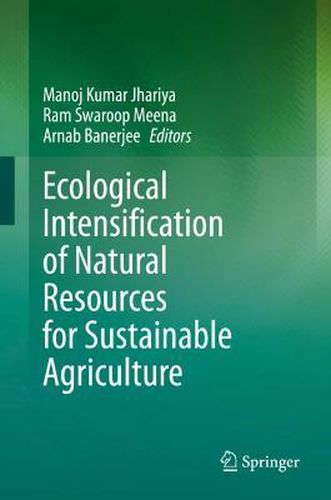Readings Newsletter
Become a Readings Member to make your shopping experience even easier.
Sign in or sign up for free!
You’re not far away from qualifying for FREE standard shipping within Australia
You’ve qualified for FREE standard shipping within Australia
The cart is loading…






This title is printed to order. This book may have been self-published. If so, we cannot guarantee the quality of the content. In the main most books will have gone through the editing process however some may not. We therefore suggest that you be aware of this before ordering this book. If in doubt check either the author or publisher’s details as we are unable to accept any returns unless they are faulty. Please contact us if you have any questions.
Ecological intensification involves using natural resources such as land, water, soil nutrients, and other biotic and abiotic variables in a sustainable way to achieve high performance and efficiency in agricultural yield with minimal damage to the agroecosystems. With increasing food demand there is high pressure on agricultural systems. The concept of ecological intensification presents the mechanisms of ensuring high agricultural productivity by restoration the soil health and landscape ecosystem services. The approach involves the replacement of anthropogenic inputs with eco-friendly and sustainable alternates. Effective ecological intensification requires an understanding of ecosystems services, ecosystem’s components, and flow of resources in the agroecosystems. Also, awareness of land use patterns, socio-economic factors, and needs of the farmer community plays a crucial role. It is therefore essential to understand the interaction of ecosystem constituents within the extensive agricultural landscape. The editors critically examined the status of ecological stress in agroecosystems and address the issue of ecological intensification for natural resources management. Drawing upon research and examples from around the world, the book is offering an up-to-date account, and insight into the approaches that can be put in practice for poly-cropping systems and landscape-scale management to increase the stability of agricultural production systems to achieve ‘Ecological resilience’. It further discusses the role of farmer communities and the importance of their awareness about the issues. This book will be of interest to teachers, researchers, climate change scientists, capacity builders, and policymakers. Also, the book serves as additional reading material for undergraduate and graduate students of agriculture, forestry, ecology, agronomy, soil science, and environmental sciences. National and international agricultural scientists, policymakers will also find this to be a useful read for green future.
$9.00 standard shipping within Australia
FREE standard shipping within Australia for orders over $100.00
Express & International shipping calculated at checkout
This title is printed to order. This book may have been self-published. If so, we cannot guarantee the quality of the content. In the main most books will have gone through the editing process however some may not. We therefore suggest that you be aware of this before ordering this book. If in doubt check either the author or publisher’s details as we are unable to accept any returns unless they are faulty. Please contact us if you have any questions.
Ecological intensification involves using natural resources such as land, water, soil nutrients, and other biotic and abiotic variables in a sustainable way to achieve high performance and efficiency in agricultural yield with minimal damage to the agroecosystems. With increasing food demand there is high pressure on agricultural systems. The concept of ecological intensification presents the mechanisms of ensuring high agricultural productivity by restoration the soil health and landscape ecosystem services. The approach involves the replacement of anthropogenic inputs with eco-friendly and sustainable alternates. Effective ecological intensification requires an understanding of ecosystems services, ecosystem’s components, and flow of resources in the agroecosystems. Also, awareness of land use patterns, socio-economic factors, and needs of the farmer community plays a crucial role. It is therefore essential to understand the interaction of ecosystem constituents within the extensive agricultural landscape. The editors critically examined the status of ecological stress in agroecosystems and address the issue of ecological intensification for natural resources management. Drawing upon research and examples from around the world, the book is offering an up-to-date account, and insight into the approaches that can be put in practice for poly-cropping systems and landscape-scale management to increase the stability of agricultural production systems to achieve ‘Ecological resilience’. It further discusses the role of farmer communities and the importance of their awareness about the issues. This book will be of interest to teachers, researchers, climate change scientists, capacity builders, and policymakers. Also, the book serves as additional reading material for undergraduate and graduate students of agriculture, forestry, ecology, agronomy, soil science, and environmental sciences. National and international agricultural scientists, policymakers will also find this to be a useful read for green future.